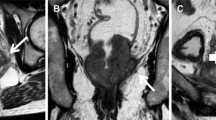Abstract
Background
Extramural venous invasion (EMVI) is a prognostic factor in rectal cancer. There are two types: EMVI detected by magnetic resonance imaging (MRI) (mr-EMVI) and EMVI detected by pathology (p-EMVI). They have been separately evaluated, but they have not yet been concurrently evaluated. We therefore evaluate both mr-EMVI and p-EMVI in rectal cancer at the same time and clarify their association with prognosis.
Patients and Methods
Included were the 186 consecutive patients who underwent complete radical resection of tumors ≤ stage III at Wakayama Medical University Hospital, Japan, between 2010 and 2018. All underwent preoperative MRI examination, and were reassessed for EMVI by a radiologist. Surgically resected specimens were then reassessed for EMVI by a pathologist. We assessed the correlation between positivity of mr-EMVI and p-EMVI and prognosis, and the clinicopathological background behind them.
Results
Patients with double negativity for mr-EMVI and p-EMVI had better prognosis than patients with mr-EMVI or p-EMVI positivity (p < 0.0001). Positivity for mr-EMVI or p-EMVI was a poor independent prognostic factor in multivariate analysis.
Conclusions
Combined analysis of mr-EMVI and p-EMVI may enable prediction of postoperative prognosis of rectal cancer. Patients with double negativity of mr-EMVI and p-EMVI had better prognosis than patients with some form of positivity. Stated differently, patients with positivity of mr-EMVI, p-EMVI, or both had a poorer prognosis than those with double negativity. Postoperative adjuvant chemotherapy may improve poor prognosis. Combined evaluation of mr-EMVI and p-EMVI may be used to predict clinical outcomes and may be an effective prognostic predictor of rectal cancer.




Similar content being viewed by others
References
MERCURY Study Group. Diagnostic accuracy of preoperative magnetic resonance imaging in predicting curative resection of rectal cancer: prospective observational study. BMJ. 2006;333(7572):779. https://doi.org/10.1136/bmj.38937.646400.55.
Battersby NJ, How P, Moran B, et al. Prospective validation of a low rectal cancer magnetic resonance imaging staging system and development of a local recurrence risk stratification model. Ann Surg. 2016;263:751–60.
Ueno H, Mochizuki H, Shirouzu K, et al. Actual status of distribution and prognostic impact of extramural discontinuous cancer spread in colorectal cancer. J Clin Oncol. 2011;29:2550–6.
Ueno H, Mochizuki H, Shirouzu K, et al. Multicenter study for optimal categorization of extramural tumor deposits for colorectal cancer staging. Ann Surg. 2012;255:739–46.
Yokoyama S, Matsuda K, Watanabe T, et al. Perineural invasion is associated with poor survival after preoperative chemoradiation therapy for advanced lower rectal cancer. Dig Surg. 2017;34:387–93.
Chand M, Swift RI, Tekkis PP, Chau I, Brown G. Extramural venous invasion is a potential imaging predictive biomarker of neoadjuvant treatment in rectal cancer. Br J Cancer. 2014;110:19–25.
Patel UB, Brown G, Machado I, et al. MRI assessment and outcomes in patients receiving neoadjuvant chemotherapy only for primary rectal cancer: long-term results from the GEMCAD 0801 trial. Ann Oncol. 2017;28(2):344–53.
Cho MS, Park YY, Yoon J, et al. MRI-based EMVI positivity predicts systemic recurrence in rectal cancer patients with a good tumor response to chemoradiotherapy followed by surgery. J Surg Oncol. 2018;117(8):1823–32.
Chand M, Bhangu A, Wotherspoon A, et al. EMVI-positive stage II rectal cancer has similar clinical outcomes as stage III disease following preoperative chemoradiotherapy. Ann Oncol. 2014;25(4):858–63.
Betge J, Pollheimer MJ, Lindtner RA, et al. Intramural and extramural vascular invasion in colorectal cancer: prognostic significance and quality of pathology reporting. Cancer. 2012;118(3):628–38.
Maughan NJ, Morris E, Forman D, Quirke P. The validity of the Royal College of Pathologists’ colorectal cancer minimum dataset within a population. Br J Cancer. 2007;97(10):1393–8.
Chand M, Siddiqui MRS, Swift I, Brown G. Systematic review of prognostic importance of extramural venous invasion in rectal cancer. World J Gastroenterol. 2016;22(4):1721–6.
Leijssen LGJ, Dinaux AM, Amri R, et al. Impact of intramural and extramural vascular invasion on stage II-III colon cancer outcomes. J Surg Oncol. 2019;119(6):749–57.
Swets M, Kuppen PJK, Blok EJ, et al. Are pathological high-risk features in locally advanced rectal cancer a useful selection tool for adjuvant chemotherapy? Eur J Cancer. 2018;89:1–8.
Zhang X-Y, Wang S, Li X-T, et al. MRI of extramural venous invasion in locally advanced rectal cancer: relationship to tumor recurrence and overall survival. Radiology. 2018;289:677–85.
Fournier FR, Motamedi MAK, Brown CJ, et al. Oncologic outcomes associated with MRI-detected extramural venous invasion (mrEMVI) in rectal cancer. A systematic review and meta-analysis. Ann Surg. 2022;275(2):303–14.
Oki E, Murata A, Yoshida K, et al. A randomized phase III trial comparing S-1 versus UFT as adjuvant chemotherapy for stage II/ III rectal cancer (JFMC35-C1: ACTS-RC). Ann Oncol. 2016;27:1266–72.
Smith NJ, Barbachano Y, Norman AR, et al. Prognostic significance of magnetic resonance imaging-detected extramural vascular invasion in rectal cancer. Br J Surg. 2008;95:229–36.
Baxter NN, Kennedy EB, Bergsland E, et al. Adjuvant therapy for stage II colon cancer: ASCO guideline update. J Clin Oncol. 2022;40(8):892–910.
Meyers BM, Cosby R, Quereshy F, et al. Adjuvant chemotherapy use for stage II and III colon cancer following complete resection: a Cancer Care Ontario systemic review. Clin Oncol. 2017;29(7):459–65.
Acknowledgment
We gratefully acknowledge the work of past and present members of the Departments of Human Pathology and Radiology at Wakayama Medical University, Wakayama, Japan. We acknowledge proofreading and editing by Benjamin Phillis at the Clinical Study Support Center, Wakayama Medical University, Wakayama, Japan.
Author information
Authors and Affiliations
Corresponding author
Ethics declarations
Disclosure
There are no conflicts of interest in relation to this study.
Additional information
Publisher's Note
Springer Nature remains neutral with regard to jurisdictional claims in published maps and institutional affiliations.
Supplementary Information
Below is the link to the electronic supplementary material.
Rights and permissions
Springer Nature or its licensor (e.g. a society or other partner) holds exclusive rights to this article under a publishing agreement with the author(s) or other rightsholder(s); author self-archiving of the accepted manuscript version of this article is solely governed by the terms of such publishing agreement and applicable law.
About this article
Cite this article
Sakanaka, T., Iwamoto, H., Matsuda, K. et al. Double Negativity of MRI-Detected and Pathologically-Diagnosed Extramural Venous Invasion is a Favorable Prognostic Factor for Rectal Cancer. Ann Surg Oncol 31, 2425–2438 (2024). https://doi.org/10.1245/s10434-023-14830-4
Received:
Accepted:
Published:
Issue Date:
DOI: https://doi.org/10.1245/s10434-023-14830-4




